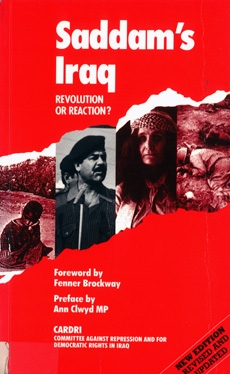|
PREFACE
This book by CARDRI (Committee Against Repression and for Democratic Rights in Iraq) is dedicated to all the victims of human rights violations in Iraq: Iraqis summarily executed, Iraqis tortured and killed, Iraqis who have “disappeared”, Iraqis detained without trial by the Saddam Husain dictatorship, Iraqis deported in their tens of thousands, Iraqis forced into exile or terrorized in their homeland.
Reports of terror and repression in Iraq in late 1978 led many British Parliamentarians and others, from across the political spectrum, to sponsor the formation of CARDRI, with the aim of exposing the brutality of the Ba‘th regime and developing solidarity with those in Iraq struggling for human and democratic rights in immensely difficult and dangerous conditions.
Saddam Husain’s war against Iran launched in September 1980 brought the Iraqi people incalculable human misery and devastation to their economy. It has been used as a smokescreen for intensification of repression against all sections of Iraqi society.
What kind of regime would do so much damage to a country just to keep control of it? CARDRI welcomed Zed’s invitation to try to answer this question. The result is this book, a serious work of scholarship by British and Iraqi academics and activists, with personal testimonies from victims of Ba‘th terror.
Those in Iraq who suffer and sacrifice for democracy in their country are those the regime tries to silence with brutal repression. We hope we have helped their voices to reach you.
Ann Clwyd MP, Chair, CARDRI
Introduction
Iraq is a country three times the size of Britain with a population of 14 million. Most Iraqis are Arabs, but about 25% are Kurds, and there are ethnic minorities such as Assyrians, Turcomans and Armenians. Although Islam is the religion of the state, there are about half a million Christians and other smaller religious minorities. About 75% of Iraqi Arabs are Shi'is, but the Kurds are mostly Sunnis, with the result that the Sh‘is form between 55 and 60% of the total population.
In 1947 about 35% of the population lived in towns and 65% in the countryside. According to the latest census, taken in 1977, 64% of the population live in towns and 36% in the countryside, a direct reversal of the urban-rural proportions in only 30 years. There are 114 million industrial workers, making up to 5 million with their families. The main industries are the oil industry, textiles and transport (particularly railways and docks). Iraq exports mainly oil and dates, and imports food, consumer goods, machinery and armaments.
Iraq’s main towns are the capital, Baghdad, which has a population of about 3 million; Basra, a southern oil town and the country’s main port, on the Gulf, with a population of about 400,000; Mosul, the largest town in the north, with a population of about 300,000; Kirkuk, the central town of the northern oilfields, with a population of about 200,000; the Kurdish towns of Arbil and Sulaimaniya;and the Shi‘i holy cities of Najaf and Karbala.
The mountainous north of Iraq borders Turkey and northern Iran; the marshy south borders southern Iran; and the desert west borders Kuwait, Saudi Arabia, Jordan and Syria. There is fertile land around Iraq’s two great rivers, the Tigris and the Euphrates. Their junction is claimed to be the site of the Garden of Eden and they gave the area its Greek name, Mesopotamia, “land between the two rivers”.
Mesopotamia was one of the places where human civilisation began nearly 5000 years ago and its ancient cities of Ur, Babylon, Assur, Nimrud and Nineveh were probably the source of the Old Testament stories of Noah’s Flood and the Tower of Babel. The Code of Hammurabi, king of Babylon about 2000 BC, contained the world’s earliest written laws. It decreed the death penalty for the builder of a badly made house if it collapsed killing the owner; and in the case of a robbery “if the robber is not caught, the man … | 